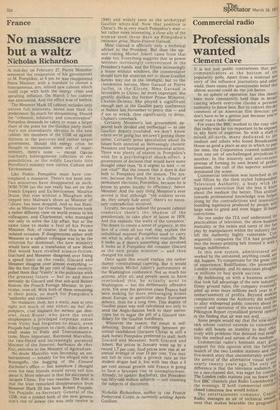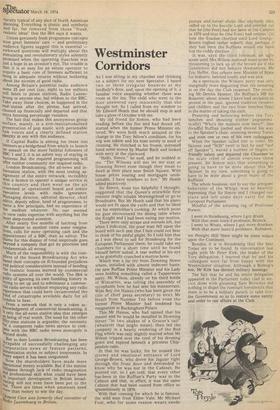Commercial radio
Professionals wanted
Clement Cave
It is not just public contrariness that puts communicators at the bottom of the, popularity polls. Apart from a mistrust and envy of the influence journalists and other wield, there exists the questionable belief that almost anyone could do the job better. In no sphere of operation has this theory been more consistently held than in broadcasting where everyone claims a personal authority to know best. But to contort the dry comment of an American film director: y00 don't have to be a genius just because you've never run a radio station! For years the BBC worked to the cosy view, that radio was far too important to be exposed to any form of expertise. So with a staff uf mixed all-sorts, many dedicated to the medium and others who found Broadcasting House as good a place as any in which to Pas,s the time, the Corporation coasted sublimeiY from one set of unchallenged prejudices to another. In the leisurely and uncontested process of forming its own brand of professionalism, the cult of the superior amateur dominated the scene. Commercial television was launched in the mid-'fifties by the then styled Independent Television Authority, a body with the ingrained conviction that the less it knew about the medium the better. This attitude towards professional knowledge was helpe°, along by the contradictions and insensitive founding legislation produced by people witbd large axes to grind and even bigger ill-base convictions. • No one under the ITA roof understood the practicalities of television, the show-businessi mentality or the twists and turns of the fas, play by manipulators within the industry thai left the Authority highly vulnerable. Conj sequently companies the ITA had propene into the money-printing belt treated it with benign indifference. In this new system, administered and worked by the untutored, anything could, all.j did, happen. To compensate for the great 01" of experience, Rediffusion, the pioneeriagd London company, and its associates ploughe in millions to buy quick success. By bulldozing on with a business acunteel that took full advantage of the new industry's flimsy ground rules, the company eventuail„Y piled up even more millions each year in:3`; embarrassment of profits. Beyond mak!1% complacent noises the Authority did nothlab to allay widespread public concern about the control and operation of the service until the Pilkington Report crystallised general ()pin° in the finding that all was not well,. Some people would say that the noN1v-stYle, J 113A whose control extends to commercia' 1 radio still boasts an inability to deal effect I tively with problems that demand real insig!'" 1 into the method and nature of the medium. 5 Commercial radio's hesitant start give support for this opinion with the falter/II launch of the two London stations and the,l5 five-month story that uncomfortably paralle,' the arrival of the alternative visual syste'l nearly twenty years ago. The only difference is that the television audience, on a one-channel diet, was eager for contras,' a The London radio stations join no fewer tha,'„ five BBC channels plus Radio Luxembourg l'15 the evenings. If both commercial stati01/ t closed tomorrow few would notice. The entertainment company, CaPith ( Radio, manages an air of technical smo°t1'; I ness that makes bearable the prograill'"
vacuity typical of any slice of North American Planning. Everything is plastic and synthetic and far, far removed from those "fresh, realistic ideas" that the IBA says it wants.
Unless genuinely fresh programme concepts soon greet listeners' ears — and preliminary audience figures suggest this is essential _ awkward questions will multiply about the stimulating and revolutionary styles solemnly promised when the operating franchise was Just a hope in an investor's eye. The trouble is that it is so easy for an astute operator to acquire a basic core of listeners sufficient to bring in adequate returns without bothering about the niceties of good radio.
Among Britain's potential radio audience some 25 per cent (say, eight to ten million) Will listen to pirate stations, Radio Luxembourg or anyone else, but seldom to the BBC. Take away these choices, as happened in the mid-'sixties after the pirates had arrived, Cleaned up financially and departed and that extra listening percentage vanishes. The bait that makes this anonymous group surface, mainly, is a non-institutionalised Presentation of pop music with personable link voices and a clearly defined station identity in key with this audience.
If Capital Radio is aiming tor these lost listeners as a bridgehead from which to launch an assault on the more faithful followers of I313C 1 and 2, it is an astute way of staying in business. But the required programming will Offer neither community nor inspired radio. London Broadcasting, the all-news and information station, with the most testing assignment of the entire network, incredibly Won a licence to operate a unique service in this country and then went on the air crammed at operational board and senior executive levels with radio ignorance. Managing director, editorial director, chief editor, deputy editor, head of programmes, to name a few principals, had no experience of the medium whatever. No one seemed to view radio expertise with anything but the most deep-rooted aversion. After nearly five months of lurching from one disaster to another came some resignations, calls for more operating cash and the appointment of a BBC man as editor. The aLlame for this display of total ineptitude goes ueYond a company that got its priorities and fundamentals all wrong. Much of the responsibility is with the cornOilers of the Sound Broadcasting Act who based their concepts on ill-founded prejudices ,,1_1(1 political considerations instead of heeding the realistic lessons learned by commercial radio systems all over the world. The IBA is gl-lilty of ignoring its own fumbling history in trY, ing to set up and to administer a commercial radio service without employing any radio LeXPerience that could have circumvented the :ind of catastrophe available daily for all London to hear.
From a network that is only a token ac9owledgment of commercial broadcasting, it Is only the all-news station idea that emerges 1.s being of real worth. The need for the other flftY-nine stations is arguable; the necessity a competent radio news service to comPete with the BBC radio news monopoly is ueYond doubt.
i am to date London Broadcasting has been lcapable of successfully challenging any orporation news or feature patterns, tesentation styles or subject treatments. In s'erY aspect it has been outgunned.
, Now the shareholders have made more
e'Perational money available. But if the station a°11apses through lack of radio imagination alld professional skill what could have been ji important development in British broad, tasting will not even have been put to the st. There are times when amateurs need 'lure than money to win the day. Ole bi ?Tient Cave was formerly chief executive of 'I `tactio Luxembourg in Britain.



































 Previous page
Previous page